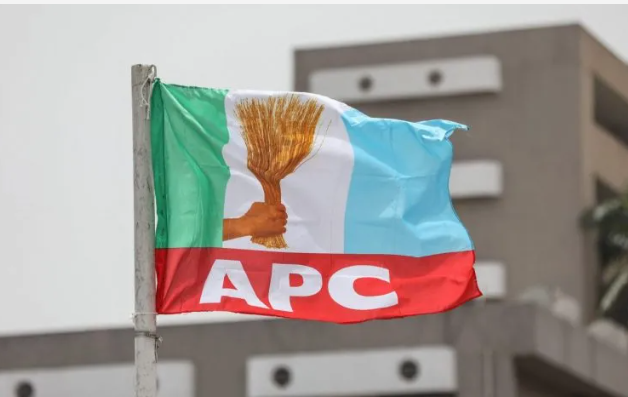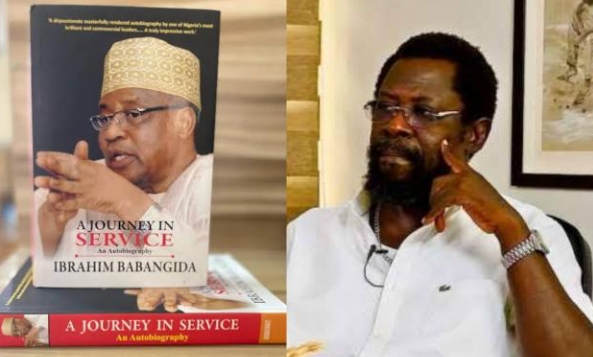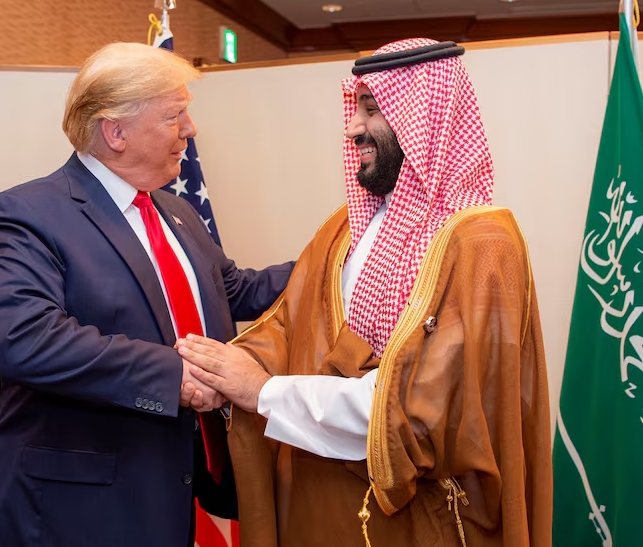News
Emirate Tussle: NNPP, Not Tinubu Will Suffer Election Loss In 2027 — APC

By Kayode Sanni-Arewa
Kano State chapter of the All Progressives Congress (APC), said in view of the prevailing dispute over the Kano Emirates, the ruling New Nigeria Peoples Party (NNPP) will suffer re-election in 2027, and not President Bola Tinubu as speculated in some quarters.
The State Chairman of the APC, Abdullahi Abbas, said in a statement that the party is now more united, popular and will deliver triple of what it got in the last presidential election in Kano State due to failures of the current NNPP administration in the state.
Abbas said contrary to a media report credited to the Kano State NNPP Chairman, Hashimu Dungurawa, it is the ruling party in the state and its national leader, Engr. Rabiu Musa Kwankwaso that will suffer the consequences of the ongoing Emirship tussle negatively.
The Kano NNPP Chairman had said the lingering Emirship tussle may negatively work against President Tinubu’s second term ambition in 2027.
But the Kano APC Chairman said the claim by the NNPP’s state chairman was an indication of the party’s frustration in the state and the nation’s political scene.
He added that the crisis of confidence rocking the factionalised opposition NNPP and its embattled leader, Senator Kwankwaso is embarrassingly exposing its dismal failure, even as it is boasting of clinching the nation’s presidency comes 2027.
According to Abbas, Kwankwaso’s presidential debut in 2023 was deliberately intended to test his national outlook, relevance in the scheme of things, manipulate the way for his son in-law to have his way and also to reclaim Kano from the APC.
“Kwankwaso got 1,454,649 total votes, representing only 6.23 per cent, and most of them from Kano. In fact, media post-election analysis showed that Kwankwaso did not get up to 100,000 votes elsewhere aside from Kano,” he said.
Abbas pointed out that Kwankwaso got 1.2 million or 19 per cent of the total votes in the North-west, his geo political zone, and almost nothing in other regions of the country.
“How come Peter Obi, the presidential candidate of the opposition Labour Party from far away South East bested Kwankwaso in 13 northern states of Kaduna, Taraba, Borno, Gombe, Kebbi, Kogi, Kwara, Niger, Sokoto, Nasarawa, Plateau, Adamawa and Benue,” he queried.
The APC Chairman said the people of Kano and leaders of thought in the Northern Nigeria understood that the only interest of the Federal Government in the lingering Emirate crisis in Kano is to ensure that the rule of law prevail for peace and tranquility in the largest populated state.
He reminded the NNPP Chairman and his group how they were roundly beaten in 2019 and narrowly escaped in 2023 based on votes statistics despite having a presidential candidate from Kano State.
Abbas said, “Aside widely acknowledged poor performance of Governor Abba Yusuf-led NNPP government in Kano State in the last one year, the party’s penchant for causing and sponsoring crisis in a peaceful state he inherited and some of his anti-people’s policies are factors voters will consider in the next election.
“It is a public knowledge that while other state governors were commissioning one project or the other to mark their one year in office, the NNPP Kano State government was busy distracting the good people of Kano from his obvious failures through the contentious Emirate law as a tactic from his inadequacies in office.”
He added that in 2027, the people of Kano State whose houses were demolished and rendered homeless will not forget in a hurry, those whose sources of economic survival and businesses were destroyed and will not vote NNPP again, among many other categories of people already badly affected by the “current misfit government in Kano.”
Abbas stated that bringing up the issue of 2027 presidential election by the Kano NNPP chairman in the face of an apparent failure of the government was not only diversionary, but an indication of a plan to plunder the resources of the state in the name of candidature.
The APC chairman maintained that Kwankwaso would continue to lose the presidential election because he still does not have the national outlook to contest the nation’s coveted seat.
Abbas added that since his debut into the political scene, to him, everything has to be about him and nothing else, and that the process also had to be manipulated.
“When Kwankwaso contested the gubernatorial primaries in 1999 on the platform of Peoples Democratic Party, alongside Dr. Abdullahi Umar Ganduje, Mukthari Zimit and Alhaji Kabiru Rabi’u, he didn’t win the election. He had to rig the election in Gabasawa with only 86 votes, which Ganduje vehemently rejected. But the party leadership had to prevail on him to let it go,” he said.
The APC Chairman stated that the NNPP government in Kano State started on a wrong footing by going against the very essence of governance, which is the people, and always wants to distract the people from its apparent failure.
“We are using this medium to assure our able and capable President, including the party’s national leadership that Kano State APC is now more united, popular and is daily attracting politically valuable people into our fold. We are ready and will deliver more than triple of the votes we got in 2023 presidential election,” he boasted.
News
Saudi Arabia donates 100 tonnes of dates to Nigeria as fasting approaches

By Kayode Sanni-Arewa
The Embassy of the Kingdom of Saudi Arabia in Abuja has held an official ceremony to distribute 100 tonnes (100,000kg) of dates to Nigeria as part of its annual humanitarian relief efforts.
The initiative, facilitated by the King Salman Humanitarian Aid and Relief Centre (KSrelief), aims to support vulnerable families across the country and strengthen the deep-rooted ties between the two nations.
During the ceremony, the Ambassador of the Custodian of the Two Holy Mosques to Nigeria, Faisal bin Ibrahim, conveyed the Kingdom’s dedication to humanitarian causes.
He expressed his profound gratitude to King Salman bin Abdulaziz and Crown Prince Mohammed bin Salman for their unwavering support in providing aid to Muslims and underserved communities worldwide.
He emphasised that Saudi Arabia remains steadfast in its commitment to fostering Islamic solidarity and providing relief to those in need.
Mr Al-Ghamdi explained that this year’s distribution includes 50 tonnes of dates for Abuja and another 50 tonnes for Kano, continuing Saudi Arabia’s tradition of assisting Nigeria through humanitarian donations.
He noted that the initiative represents the Kingdom’s broader mission to uplift Muslim communities, alleviate suffering, and promote unity, particularly during significant religious periods such as Ramadan.
The embassy, in collaboration with local authorities and humanitarian organisations, will ensure the proper distribution of the dates so that they reach the most vulnerable families in various regions of Nigeria
Saudi Arabia has been a longstanding partner in providing humanitarian aid to nations across the globe, including Nigeria. The Kingdom’s continued efforts in supporting food security and welfare initiatives exemplify its role as a global leader in charitable and humanitarian endeavours.
Through Vision 2030, Saudi Arabia seeks to expand its contributions to international humanitarian causes, reinforcing its dedication to fostering peace, stability, and prosperity worldwide. The ongoing provision of aid to Nigeria is a testament to these commitments and highlights the decades-long partnership between the two brotherly nations.
News
Babangida’s Book is filled with distorted facts, collection of lies, says Dele Farotimi

By Kayode Sanni-Arewa
Dele Farotimi, a human rights lawyer, has launched a heavy attack on former dictator Gen. Ibrahim Babangida (retd.), describing his reign as “ruinous”.
Farotimi, who lived through Babangida’s rule, recounted his experiences as a participant in the fight against the former leader’s “evil actions and inactions
Farotimi’s comments come after Babangida’s recent admission that Chief M.K.O. Abiola won the 1993 presidential election, which Babangida annulled.
The human rights lawyer expressed his disappointment, but not surprise, at the “mixed bag of lies, half-truths, urban legends, and obfuscations” in Babangida’s recent statements.
Farotimi’s criticism is not isolated, as many Nigerians have questioned Babangida’s legacy and the lack of consequences for his actions. The annulment of the 1993 election led to widespread protests and a prolonged struggle for democracy in Nigeria.
In a statement, Farotimi concluded, “No hagiographic allocutus can redeem the Evil Genius of Minna”.
The statement was shared on X while he was reacting to a comment made by Adnan Abdullahi Adam, which stated that “it’s better to read every side of exposition before forming your own judgement”.
With the cover picture of the IBB’s memoir “A Journey In Service” @realadnantweet wrote:
“I think IBB’s memoir: “A Journey in Service” exposes a fresh perspective on everything.
“It’s better to read every side of exposition before forming your own judgement.
“Everyone should try reading the book as jury to the plea of the accused.”
Responding Farotimi wrote: “I lived through his ruinous reign. I wasn’t a passive victim of his evil actions and inactions, I was a participant in the fight to be freed of him.
“I am painfully aware of the extent of his evil capabilities, and I have not been disappointed by the mixed bag of lies, half truths, urban legends, and obfuscations contained in the excerpts already in the public domain. No hagiographic allocutus can redeem the Evil Genius of Minna.”
On Thursday, February 20, 2025, former Nigerian military ruler General Ibrahim Badamasi Babangida (IBB) released his long-anticipated autobiography, “A Journey in Service.”
The memoir has ignited a firestorm of controversy, with critics accusing Babangida of distorting historical events and maligning deceased individuals who cannot defend themselves.
This development has reopened debates about his tenure and its lasting impact on Nigeria’s political and economic landscape.
Babangida’s tenure from 1985 to 1993 was marked by the implementation of the Structural Adjustment Programme (SAP), among others. In “A Journey in Service,” he provides an insider’s perspective on the adoption of SAP, aiming to offer context for the controversial policy that aimed to liberalize Nigeria’s economy.
While intended to address economic challenges, SAP led to widespread protests and debates due to its harsh austerity measures and the social hardships it imposed.
Critics, however, contend that Babangida’s memoir serves as a self-exoneration tool, selectively presenting events to absolve himself of blame.
Human rights lawyer and former Chairman of the Nigerian Human Rights Commission, Prof. Chidi Odinkalu, described the book as a “pack of lies,” accusing Babangida of making allegations against deceased individuals who cannot contest his claims.
Odinkalu further criticized Babangida for portraying himself as a victim of circumstances orchestrated by those who are no longer alive to defend themselves.
The memoir has also rekindled discussions about Babangida’s annulment of the June 12, 1993, presidential election, widely regarded as one of Nigeria’s freest and fairest elections. In the book, Babangida attempts to justify the annulment, a move that plunged the nation into political turmoil and prolonged military rule. Many Nigerians view this action as a significant setback to the country’s democratic progress.
News
Saudi Arabia plans to invest $600bn in new US trade over 4 years

By Kayode Sanni-Arewa
Saudi Arabian Crown Prince Mohammed bin Salman told President Donald Trump that the kingdom wants to put $600 billion into expanded investment and trade with the United States over the next four years, the Saudi State news agency said early on Thursday.
In a phone call between the two leaders, the crown prince said the Trump administration’s expected reforms could create “unprecedented economic prosperity”, the state news agency reported.
The report said Saudi Arabia wants its investments to capitalize on these conditions. It did not detail the source of the $600 billion, whether it would be public or private spending nor how the money would be deployed.
The investment “could increase further if additional opportunities arise”, the agency quoted Bin Salman as telling Trump.
Trump fostered close ties with Gulf states including Saudi Arabia during his first term. The country invested $2 billion in a firm formed by Jared Kushner, Trump’s son-in-law and former aide, after Trump left office.
Trump said following his inauguration on Monday that he would consider making Saudi Arabia his first destination for a foreign visit if Riyadh agreed to buy $500 billion worth of American products, similar to what he did in his first term.
“I did it with Saudi Arabia last time because they agreed to buy $450 billion worth of our product. I said I’ll do it but you have to buy American product, and they agreed to do that,” Trump said, referring to his 2017 visit to the Gulf kingdom.
The Reuters Daily Briefing newsletter provides all the news you need to start your day. Sign up here.
Reporting by Hatem Maher; Editing by Leslie Adler and Cynthia Osterman
-

 News22 hours ago
News22 hours agoJust in : Senator Gumau is dead
-

 News22 hours ago
News22 hours agoPolice seal OSSIEC office, officials nabbed, says chairman
-

 News23 hours ago
News23 hours ago10th NASS Committed to Constitutional Reforms – Kalu
-

 Metro15 hours ago
Metro15 hours agoInsecurity! Gunmen invade church, slash pastor’s 2 fingers
-

 News23 hours ago
News23 hours agoRep Salam Congratulates Governor Adeleke On Successful Conduct Of LG Elections
-

 Metro15 hours ago
Metro15 hours agoFire engulfs MTN office in Oyo
-

 News22 hours ago
News22 hours agoI have never insulted President Tinubu in my entire life”-Gov Adeleke
-

 Foreign15 hours ago
Foreign15 hours agoPentagon set to sack 5400 staff as attack hits Trump’s downsizing plan







